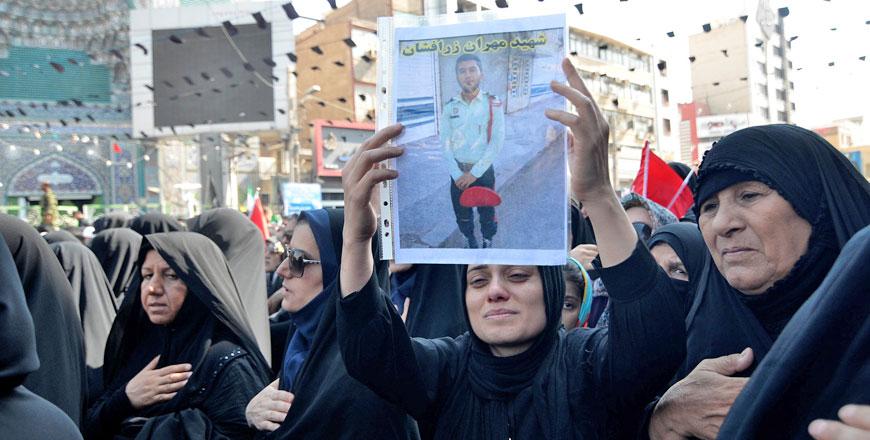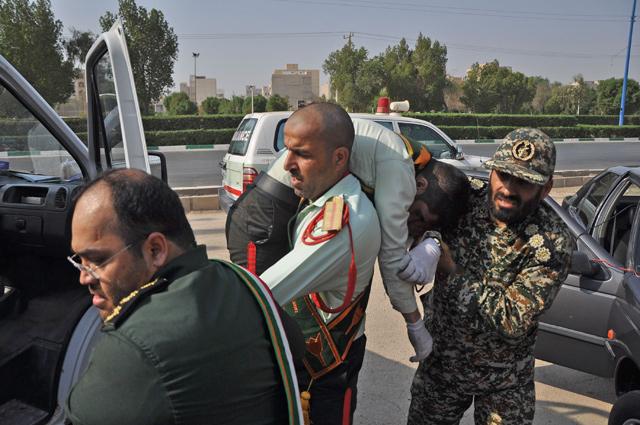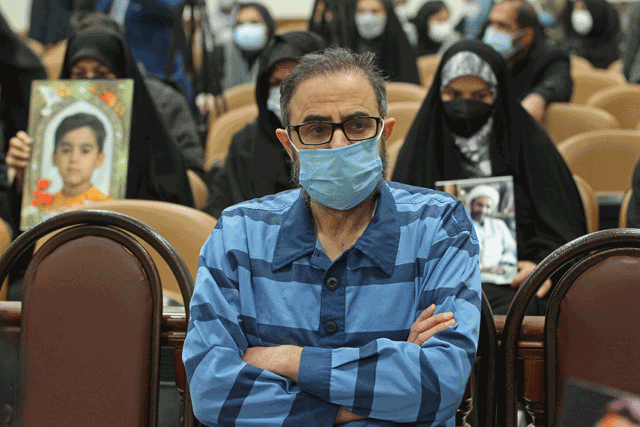You are here
Iran points finger at US allies over deadly attack
By AFP - Sep 24,2018 - Last updated at Sep 24,2018
TEHRAN — Iranian President Hassan Rouhani on Sunday pointed blame at Arab separatists for a deadly attack on a military parade and accused an unnamed US-backed Gulf state of supporting them.
Tehran also summoned diplomats from Denmark, The Netherlands and Britain for allegedly hosting members of the group suspected of links to Saturday's attack that killed at least 29 people.
Four militants attacked a parade commemorating the start of the 1980-1988 Iran-Iraq war in the southwestern city of Ahvaz, capital of the border province of Khuzestan.
Officials and an eyewitness said the gunmen were clad in Iranian military uniforms and had sprayed the crowd with gunfire using weapons they had stashed in a nearby park.
The Daesh extremist group claimed responsibility for the rare assault.
But Iranian authorities see an Arab separatist movement, the Ahwazi Democratic Popular Front (ADPF) or Al Ahwazi, as the main suspect.
“One of the countries in the south of the Persian Gulf took care of their financial, weaponry and political needs,” said President Rouhani.
“All these little mercenary countries we see in this region are backed by America. It is the Americans who incite them.”
US hits back
The United States condemned the attack, with its UN envoy saying it had happened because Rouhani has “oppressed his people for a long time”.
“He needs to look at his own base to figure out where that’s coming from. I think the Iranian people have had enough,” said Nikki Haley.
London-based opposition channel Iran International TV aired an interview Saturday with Yaqoub Hor Altostari, presented as a spokesman for ADPF, indirectly claiming responsibility for the attack and calling it “resistance against legitimate targets”.
But in a statement on its website, the group denied any involvement, accusing Iranian authorities of ordering the attack to distract from Tehran’s support for “militias in the region”.
Iran summoned diplomats from Denmark, The Netherlands and Britain to complain about them “hosting some members of the terrorist group” and “double standards in fighting terrorism”, the foreign ministry said.
The British charge d’affaires “was told that it is not acceptable that the spokesman for the mercenary Al Ahwazi group be allowed to claim responsiblity for this terrorist act through a London-based TV network”, said ministry spokesman Bahram Ghasemi.
Britain said its diplomat had extended the country’s condolences to Tehran and that Iranian officials were planning to lodge a formal complaint with the United Kingdom’s media watchdog, Ofcom.
Ghasemi also said Iran expected the Danish and Dutch governments to “hand over the perpetrators of this attack and anyone related to them to Iran for a fair trial”.
Denmark said there would be consequences if any such links were established, while The Netherlands said it had heard the Iranian version of events and offered its condolences.
Diplomatic row
Iran also warned the United Arab Emirates over “offensive remarks” attributed to a UAE “political adviser” following the attack.
Oman, Kuwait and Qatar issued condemnations of the attack, while Saudi Arabia, the UAE and Bahrain had yet to react on Sunday.
State media gave a toll of 29 dead and 57 wounded in the attack, including women and children who were spectators at the parade.
Their funerals will be held on Monday, it said.
Three attackers were also killed and the fourth died later of his injuries, the armed forces said.
Daesh had claimed the attack via its propaganda mouthpiece Amaq, and that the attack was in response to Iranian involvement in conflicts across the region.
The group published a video online showing the alleged Daesh gunmen who supposedly carried out the attack. But the video has not been validated.
The Revolutionary Guard accused Shiite-dominated Iran’s Sunni arch-rival Saudi Arabia of funding the attackers, while Iran’s Supreme Leader Ayatollah Ali Khamenei also blamed Iran’s pro-US rivals.
“A deadly and unforgettable revenge will be exacted... in the near future,” it said.
Khuzestan, which has a large ethnic Sunni Arab community, was a major battleground of the 1980s war with Iraq and it saw unrest in 2005 and 2011, but has since been largely quiet.
Kurdish rebels frequently attack military patrols on the border further north, but attacks on government targets in major cities are rare.
Related Articles
LONDON — Iranian supreme leader Ayatollah Ali Khamenei said on Monday that the attackers who killed 25 people at a military parade were paid
DUBAI — Gunmen fired on a military parade in south-western Iran on Saturday, killing 25 people, almost half of them members of the Revolutio
TEHRAN — Iran on Saturday hanged Swedish-Iranian dissident Habib Chaab for “terrorism”, drawing condemnation from Sweden, in the Islamic rep














